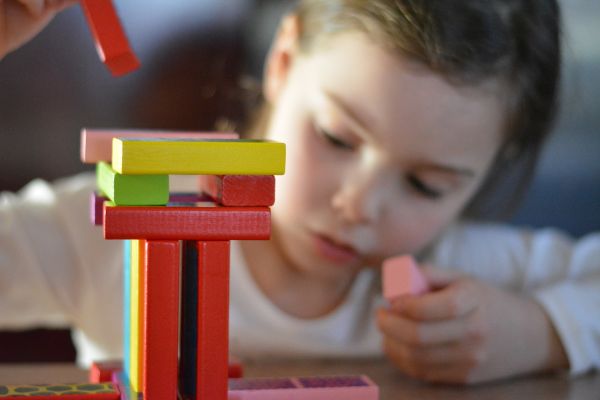IMAGINARY GAME
Verified by Psychology Today

Play
The Need for Pretend Play in Child Development
Imaginative play is a vital component to normal child development.
Posted March 6, 2012 | Reviewed by Ekua Hagan
THE BASICS
Many people often think of play in the form of images of young children at recess engaging in games of tag, ball, using slides, swings, and physically exploring their environments. But physical play is not the only kind of play.
We often use the terms pretend play or make-believe play (the acting out of stories which involve multiple perspectives and the playful manipulation of ideas and emotions), that reflect a critical feature of the child’s cognitive and social development. Over the last 75 years, a number of theorists and researchers have identified the values of such imaginative play as a vital component to the normal development of a child.
Systematic research has increasingly demonstrated a series of clear benefits of children’s engagement in pretend games from the ages of about two and one half through ages six or seven. Actual studies have demonstrated cognitive benefits such as increases in language usage including subjunctives, future tenses, and adjectives. The important concept of “theory of mind,” an awareness that one’s thoughts may differ from those of other person’s and that there are a variety of perspectives of which each of us is capable, is closely related to imaginative play (Jenkins & Astington, 2000; Leslie, 1987; Singer & Singer, 1990; Singer & Singer, 2005).
Psychologist Sandra Russ (2004) identified a number of different cognitive and affective processes that are associated with pretend play. Her research dealing with play involves fantasy, make-believe, symbolism, organization, cognitive integration of seemingly separate content, and divergent thinking (the ability to come up with many different ideas, story themes, and symbols). Pretend play allows the expression of both positive and negative feelings, and the modulation of affect, the ability to integrate emotion with cognition (Jent, Niec, & Baker, 2011; Seja, & Russ, 1999; Slade and Wolf, 1999).
The research reviewed by Berk, Mann & Ogan, (2006) and Hirsh-Pasek, Golinkoff, Berk, & Singer (2009) suggest that make-believe games are forerunners of the important capacity for forms of self-regulation including reduced aggression, delay of gratification, civility, and empathy. When children use toys to introduce possible scenarios or friends, the representation of multiple perspectives occurs naturally. Taking on different roles allows children the unique opportunity to learn social skills such as communication, problem-solving, and empathy (Hughes, 1999).
article continues after advertisement
An important benefit of early pretend play may be its enhancement of the child’s capacity for cognitive flexibility and, ultimately, creativity (Russ, 2004; Singer & Singer, 2005). Russ, for example, in longitudinal studies, found that early imaginative play was associated with increased creative performance years later (Russ, 2004; Russ, & Fiorelli, 2010). Root-Bernstein’s research with clearly creative individuals such as Nobel Prize winners and MacArthur Foundation “genius” grant awardees, indicated that early childhood games about make-believe worlds were more frequent in such individuals than in control participants in their fields (Root-Bernstein, 2012).
What are the sources in children’s environments that promote early and frequent imaginative play? Research has demonstrated that parents who talk to their children regularly explaining features about nature and social issues, or who read or tell stories at bedtime, seem to be most likely to foster pretend play (Shmukler 1981; Singer & Singer 2005).
A school atmosphere in which pretend games are encouraged, or even just tolerated in the curriculum or recess play of children has also been shown to lead to even greater amounts of imaginativeness and enhanced curiosity, and to learning skills in preschoolers or early school-agers (Ashiabi, 2007; Singer and Lythcott 2004). Indeed, educators are using pretend games to teach math and reading (Clements, & Sarama, 2009; Ginsburg, 2006).
A key question that arises from the literature is how parent and teacher training in “guided play” may influence literacy. Singer and colleagues conducted a series of studies on the effectiveness of Learning through Play, an intervention program designed to teach parents and educators how to engage in learning-oriented, imaginative play games with children (Singer, Plaskon, & Schweder, 2003).
article continues after advertisement
In the initial evaluation of the program, kindergarten children of low-SES parents who participated in the intervention showed significant gains on an academic readiness assessment than those whose parents did not participate. Modest improvements were found in subcomponents of the test, including vocabulary, knowledge about nature, general information knowledge, and knowledge about manners.
In another curriculum, Tools of the Mind, inspired by Vygotsky’s theory, scaffolding of cognitive control is woven into virtually all classroom activities (Bodrova, 2008). For example, teachers encourage complex make-believe play, guiding children in jointly planning of play scenarios before enacting them. Teachers also lead rule-switching games in which regular movement patterns shift often, requiring flexibility of attention.
Perhaps the idea of a built-in “pretend play recess” during the regular school day—where children can get together and explore an infinite amount of possible combinations of ideas, emotions, and perspectives—will one day be just as acceptable as traditional, but no less important, forms for recess and play.
This post was co-authored with Jerome L. Singer and Dorothy G. Singer. Dr. Jerome L. Singer is Professor Emeritus of Psychology at Yale University. Dr. Dorothy G. Singer is Senior Research Scientist Emeritus, Department of Psychology, Yale University.
References
Ashiabi, G.S. (2007). Play in the preschool classroom: Its socioemotional significance and the teacher’s role in play. Early Childhood Education Journal, 35, 199-207.
Bodrova, E. (2008). Make-Believe play versus academic skills: A Vygotskian approach to today’s dilemma of early childhood education. European Early Childhood Education Research Journal, 16, 357-369.
Berk, L. E., Mann, T.D., & Ogan, A.T. (2006). Make-Believe play: Wellspring for development of self-regulation. In D. Singer, R.M. Golinkoff, & Hirsh-Pasek (Eds.), Play =Learning: How play motivates and enhances children’s cognitive and social-emotional growth. New York, NY: Oxford University Press.
Clements, D.H. & Sarama. J. (2009). Learning and teaching early math: The learning trajectories approach. New York, NY: Routledge.
Ginsburg, H. P. (2006). Mathematical play and playful mathematics: A guide for early education. In D. Singer, R. M. Golinkoff, & K. Hirsh-Pasek (Eds.), Play = learning: How play motivates and enhances children’s cognitive and social-emotional growth (pp. 145-68). New York, NY: Oxford University Press, USA.
Hirsh-Pasek, K. Golinkoff, R.M., Berk, L.E., & Singer. D.G. (2009). A mandate for playful learning in preschool: Presenting the evidence. New York: Oxford University Press.
Hughes, F.P. (1999). Children, play, and development (3rd ed.). Needham Heights, MA: Allyn & Bacon.
Jenkins, J.M., & Astington, J.W. (2000). Theory of mind and social behavior: Casual models tested in a longitudinal study. Merrill-Palmer Quarterly, 46, 203-220.
Jent, J.F., Niec, L.N., & Baker, S.E. (2011). Play and interpersonal processes. In S.W. Russ & L.N. Niec (Eds.), Play in clinical practice: Evidence-based approaches. New York, NY: Guilford Press.
Leslie, A.M. (1987). Pretense and representation: The origins of “theory of mind.” Psychological Review, 94, 412-426.
Root-Bernstein, M. ( 2012). The creation of imaginary worlds. In M. Taylor (Ed.), The Oxford Handbook of the Development of Imagination. Oxford: Oxford University Press.
Russ, S.W. (2004). Play in child development and psychotherapy. Mahwah, NJ: Earlbaum.
Russ, S. & Fiorelli, J. (2010) Developmental Approaches to Creativity. In J . Kaufman & R. Sternberg (Eds.) The Cambridge Handbook of Creativity, 233-249. New York: Cambridge University Press.
Shmukler, D. (1981). Mother-child interaction and its relationship to the predisposition of imaginative play. Genetic Psychology Monographs, 104, 215-235.
Seja, A.L., & Russ, S.W. (1999). Children’s fantasy play and emotional understanding. Journal of Clinical Child Psychology, 28, 269-277.
Singer, D. G. & Singer, J. L. (1990). The house of make believe: Children’s play and the developing imagination. Cambridge, MA: Harvard University Press.
Singer, D.G.& Singer, J.L. (2005). Imagination and play in the electronic age. Cambridge, MA: Harvard University Press.
Singer, D. G., Singer, J. L., Plaskon, S. L., & Schweder, A. E. (2003). The role of play in the preschool curriculum. In S. Olfman (Ed.), All work and no play: How educational reforms are harming our preschoolers. (pp. 43-70). Westport, CT: Praeger Publishers.
Singer, J.L. & Lythcott, M.A. (2004). Fostering school achievement and creativity through sociodramatic play in the classroom. In E. F. Zigler, D.G. Singer & S. J. Bishop-Joseph (Eds.) Children’s play: The roots of reading, pp. 77-93. Washington DC: Zero to Three Press.
Slade, S & Wolf, D. P.(1999). Play: Clinical and developmental approaches to meaning and representation, Oxford University Press).Morereferences
About the Author

Scott Barry Kaufman is a humanistic psychologist exploring the depths of human potential.
Online:
ScottBarryKaufman.com, Facebook, Twitter
advertisement
Play Essential Reads

Infinite Play: Training for the Unexpected

The History and Psychology of Chess

Nostalgic Video Games Enhance Family and Familiarity

Can We Really Make Ourselves Happy? Try These Ideas

Putting a Price Tag on Children’s Play
advertisement
Get the help you need from a therapist near you–a FREE service from Psychology Today.

Cities:
- Atlanta, GA
- Austin, TX
- Baltimore, MD
- Boston, MA
- Brooklyn, NY
- Charlotte, NC
- Chicago, IL
- Columbus, OH
- Dallas, TX
- Denver, CO
- Detroit, MI
- Houston, TX
- Indianapolis, IN
- Jacksonville, FL
- Las Vegas, NV
- Los Angeles, CA
- Louisville, KY
- Memphis, TN
- Miami, FL
- Milwaukee, WI
- Minneapolis, MN
- Nashville, TN
- New York, NY
- Oakland, CA
- Omaha, NE
- Philadelphia, PA
- Phoenix, AZ
- Pittsburgh, PA
- Portland, OR
- Raleigh, NC
- Sacramento, CA
- Saint Louis, MO
- San Antonio, TX
- San Diego, CA
- San Francisco, CA
- San Jose, CA
- Seattle, WA
- Tucson, AZ
- Washington, DC
Are you a Therapist? Get Listed Today
More from Scott Barry Kaufman

Personality
4 Min Read
New research explored who enjoys magic. Two seemingly opposed personalities enjoy magic performances.

Creativity
7 Min Read
Most bestselling books on success and greatness focus on the idea that talent is overrated.

Highly Sensitive Person
3 Min Read
Do People Signal High Sensitivity to Get What They Want?
Sensory processing sensitivity is a real trait.

Narcissism
5 Min Read
The need to matter is important, but is it possible to matter too much?
More from Psychology Today

Play
4 Min Read
The Psychology Behind Breath Play
Erotic asphyxiation (breath play) is the consensual restricting of the airflow of your partner for a brief period of time.

Play
4 Min Read
6 Ways to Deal with Arrogant People
When others feel superior, do not play their game.

Self Tests
3 min
How jealous are you in your relationship?

Play
7 Min Read
9 Ways to Transform Bratty Behavior
There is no such thing as a brat, only a child who is hurting.

Play
14 Min Read
To understand schools, we must view them in historical perspective.

Play
7 Min Read
The Surprising Psychology of Rock-Paper-Scissors
Plus, 9 research-based strategies for victory.

Play
3 Min Read
Study Underscores Why Fewer Toys Is the Better Option
When it comes to toys, in terms of development and creativity, less is more.

Play
4 Min Read
Financial Abuse: What It Is, What to Do if You’re a Victim
Controlling access to financial information is a power play.



Recent Issues






Psychology Today © 2024 Sussex Publishers, LLC
Find a Therapist
- Get Help
- Find a Therapist
- Find a Treatment Center
- Find a Psychiatrist
- Find a Support Group
- Find Online Therapy
- United States
- Austin, TX
- Brooklyn, NY
- Chicago, IL
- Denver, CO
- Houston, TX
- Los Angeles, CA
- New York, NY
- Portland, OR
- San Diego, CA
- San Francisco, CA
- Seattle, WA
- Washington, DC
Get Help
Mental Health
Personality
Personal Growth
Relationships
Family Life
Do I Need Help?
Recently Diagnosed?
Talk to Someone
- Find a Therapist
- Find a Treatment Center
- Find a Psychiatrist
- Find a Support Group
- Find Online Therapy
Magazine

Sticking up for yourself is no easy task. But there are concrete skills you can use to hone your assertiveness and advocate for yourself.
Today
News
- How Our Microbiota Help Us Be More Resilient
- 3 Signs of Going Through an “Emotional Divorce”
- Why Laughter Is Such Good Medicine
- How Much Is Desire for Others Affecting Your Relationship?
Essential Reads
- How to Avoid Feeling Lonely in Later Life
- The Paradox of Helicopter Parenting
- Chronic Stress Often Links Men’s Top Two Sex Problems
- AI’s Watchful Eye on Patient Health Status
Trending Topics
See Allhttps://consentcdn.cookiebot.com/sdk/bc-v4.min.html
